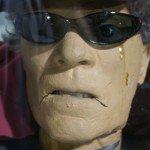I kept thinking of the Agatha Christie story, “Ten Little Indians.” Annie said it’s more like “99 Bottles of Beer on the Wall,” but there weren’t ever ninety-nine of us. We started with thirteen.
The Fuckers (and that’s their official name, we all decided) kidnapped us, threw us in the back of a black van, and brought us here–to this ancient basement shower room. Everything here is covered in small blue ceramic tiles. They locked us in, the only other thing with us being an open cardboard box. They left us in handcuffs and leg-irons, but we can move around all right, so it didn’t take long for someone, Mark, to shuffle over and look inside the box.
So that’s why he died first.
No one knows why the Fuckers didn’t die, because they must have gotten as close as Mark did. Couldn’t help it, putting those things in the box and bringing the box into the middle of the room. They had to be right up against it.
Lily, she’s the youngest by far–only thirteen–thought maybe they brought it in on a forklift. “My daddy drives one at work. He doesn’t have to touch anything.” I got along with Lily right away; she said I reminded her of her brother. She was always about the sweetest little girl you could imagine. Why the Fuckers would do this to someone like her was beyond imagining.
“Or maybe the things inside hadn’t hatched yet,” was Susan’s suggestion, but I don’t see how. Mark didn’t say anything about shells or anything. He said he just saw five of the bastards, writhing around on the bottom of the box, before one of them hissed and sprayed his face with black venom.
Not that he’d been able to tell us what they were. Even though he’d seen them, he was better at telling us what theyweren’t. “They’re not scorpions and they’re not spiders and they’re not snakes. They’re something in the middle.”
We were all more caring back in those days, before we figured out how contagious the Slug Virus was (we didn’t evencall it the Slug Virus back then, because we didn’t know yet that it was either a virus or that it had anything at all to do with slugs). We all sat there and listened to Mark joke as his face turned shiny and black and bubbled up like it was being burned from the inside. It cracked, and this gray dust fell out where his skin broke. His girlfriend kept trying to wash the dust off by having him put his face under one of the showers, thinking maybe it was that he was drying out or something. She didn’t realize it was pollen. She didn’t realize she was already just as dead as Mark.
It takes about two full days to work its way through one of us. When Mark’s skin was about seventy percent charred, he started to complain of cramps. Six hours after that, he stopped being able to joke about his situation and could only weep silently, doubling over with his girlfriend suddenly horrified to find her own skin hardening and turning that awful blue-black shade that looked like the shell of a beetle.
A few hours after that, the crying gave way to screaming and begging, Mark asking us to strangle him. To kill him. To end the pain. Of course no one could. We were all hoping something might change for the better, but it’s not that kind of world, it turns out.
He died before the giant slug made it all the way out of his mouth. We were all too horrified to do anything, no one wanted to touch him or even get too close to his body, and then the Fuckers gassed us until we passed out. When we woke up, there was no sign of the slug or Mark’s body. There was just us, the survivors: twelve little Indians, one of which was already showing signs of following her boyfriend’s lead.
She pretty much decided to spend her days crying. None of us would let her come too close. No one else wanted the Slug Virus. We made her go around one of the tiled walls to the lockers to die. She didn’t want to go, but after all the shouting and hatred, she gave up.
She let us know she hated us, though. “You’re the worst, all of you! I hope it’s worse when you get it! You’re Fuckers, too!”
Stuff like that. She kept it up for a while, then quit. Then cried. Then moaned. Then screamed. Then died. Then more gas, and after that it was quiet for a few days with no one showing any signs of anything.
But the Fuckers always fed us after they gassed us. And they always put the food next to the box. Always the same frozen dinners. Always Salisbury steak. Always exactly the right number for those of us still alive. But every time they put food out, it took a while for anyone to dare to get close to the food.
But after a while, you get hungry enough to risk it, and some of the others started to suggest maybe it wasn’t safe to leave the food close to the box for too long. If we were going to eat it, we were better off eating it quickly so it didn’t get poisoned. After someone suggested that, we started eating the food as soon as it was out.
Lily was a vegetarian, so I saved my corn and potatoes for her and she gave me her meat. I didn’t like the meat, but taking care of Lily made me feel light a nightlight was on somewhere in my head.
And so eleven became eight after one of those things in the box hit three hungry fools who were just a little too clumsy and not cautious enough for their own good. At least they had each other when they went around the corner. I remember hearing them talk and joke with each other, and I almost cried. I didn’t know why.
No one went around the corner unless they were infected, and no one ever came back around the corner once they’d gone around it. I envisioned a mess of death on the other side, because I felt pretty sure the Fuckers didn’t do much of a cleaning job when they came to take the slugs away.
It took a long time for the next one of us to screw up, but when he did–his name was Kevin–he did not take it well. He didn’t want to go around the corner, and Frank didn’t want to take his bullshit, so Frank beat Kevin to death with his bare hands and then dragged Kevin’s corpse around the corner.
“Obey the rules, or that’s what happens,” Frank said to the rest of us. “I am not dying for anyone else’s stupidity! When your time is up, you go around the corner. One way or the other.”
Everyone hoped Frank would die because of what he’d done. Secretly, we were all watching him closely, hoping that he got the marks on his face or something. You can’t just murder people without consequence. But nothing happened. He was fine. Three more days passed. We kept away from Frank anyway. Frank seemed happy in his own little corner. He glared at us with his arms over his chest and didn’t say much.
No one knew how it happened, but Judy got it next. We started wondering if the things in the box could creep out, so we set up a watch after Judy went around the corner. It didn’t help. After Judy, all bets were off. Two more went after her for no good reason, and then it was just me, Annie, Frank, and Lily.
When Lily got it, I felt the bottom drop out. I was only hanging around to look out for her, anyway. Annie, well, she was torn up, too, but not as torn up as I was, I guess. Watching Lily say goodbye to all of us, taking her little self around the corner, well … what was the point?
I looked at Annie, who was looking into the corner to the left of her, and I said, “I’m not letting Lily die alone.”
Frank scoffed at me as I passed him. “Have a nice death, loser,” he said.
“Thanks, I will,” I said, and I followed Lily around the corner.
Lily had her back to me as I came around. She was looking at the gray ash smeared on the walls. At least there weren’t any bodies. At least the Fuckers had been decent enough to get rid of those. I put my hand on Lily’s shoulder.
Lily didn’t understand why I’d come back. “But Peter, you’re not sick,” she said. “Go back!”
I reached out and drew a line with my finger through the pollen on the wall. I smeared a line of it under each eye, like a batter on a sunny day. “Too late now,” I said.
She hugged me tightly, and then we sat down and started playing Twenty Questions.
So I finally got the marks of the virus. My index finger where I touched the pollen is gone. Fell right off. Shouldn’t be long now, but it doesn’t hurt yet. I know it will, and I’m afraid. I fear how awful a death this is going to be. Lily does, too, I can tell, but she’s a brave little toaster and she doesn’t ever say anything about it. She’s still making jokes, trying to make us laugh, and I know I’d rather have her company for as long as it lasts than to sit out there clinging to ugly, selfish hope with Frank and Annie.
If they’re the only ones left, I guess I’d rather be next. If I have to go, I’d rather go with my friend.


